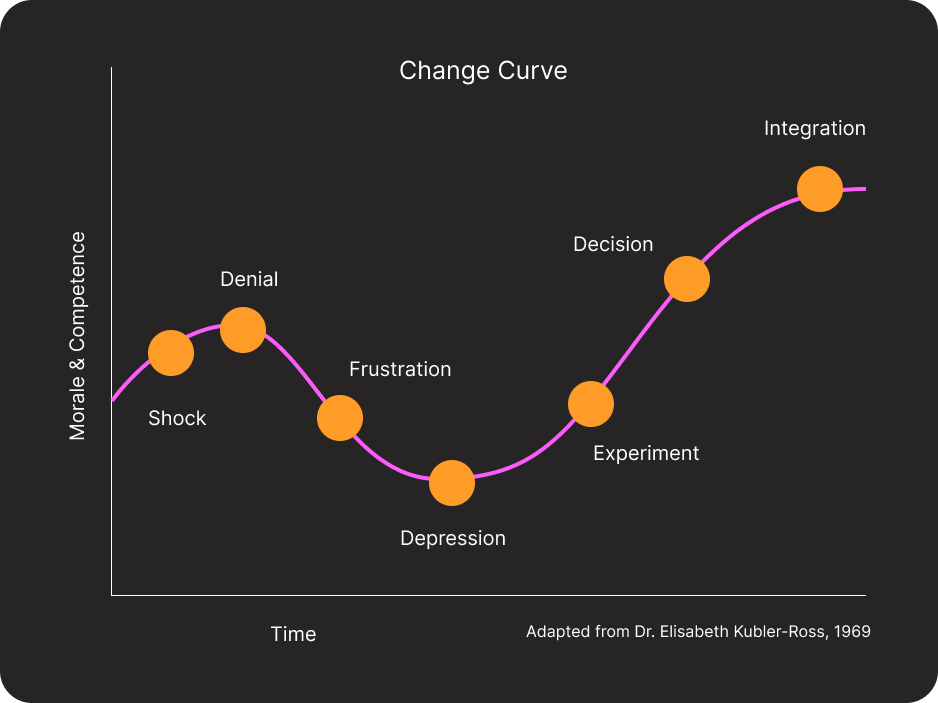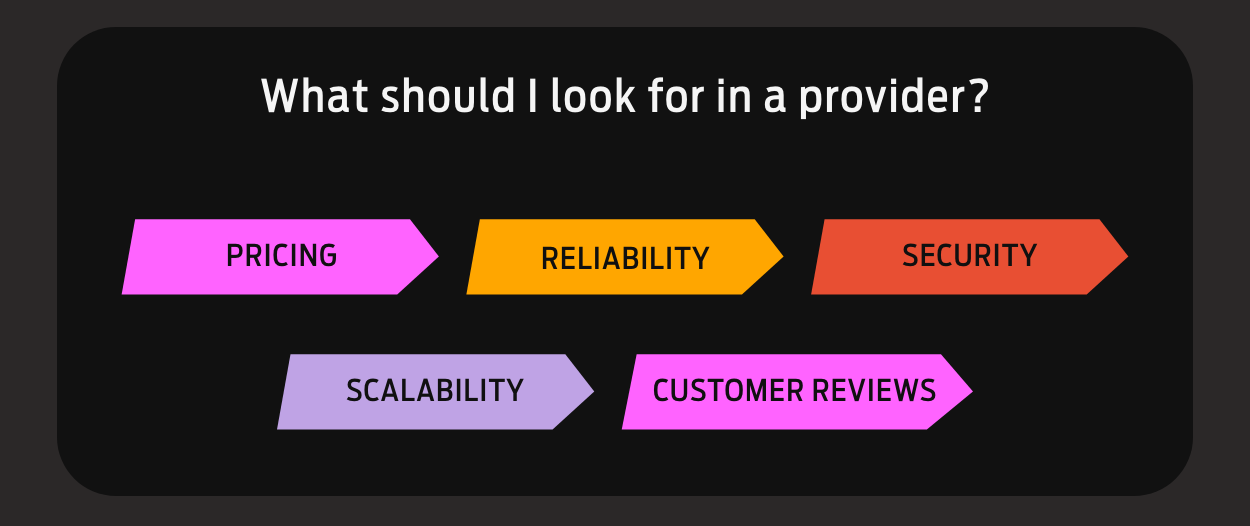After hearing Frank Ashworth, our Head of Product and Commercial, speak at the DTX Manchester event you might left feeling intrigued to hear more about digital transformation, moving to the cloud and what it has to do with grief.
If you’ve been on any form of leadership training, you may be familiar with the Change Curve and how you can support people through these individual transitions. The Change Curve maps how people are affected by organisational change across five stages: denial, anger, bargaining, depression, and acceptance.

The Change Curve, also called the Kübler-Ross Curve, is based on research by renowned Swiss-American psychiatrist Elisabeth Kübler-Ross. She was one of the most important thinkers of the 20th century. But what does her pioneering work on the five stages of grief teach us about moving from on-prem to the Cloud?
In 1969, Kübler-Ross wrote her first book titled On Death and Dying – a book that examines the attitudes of the dying and the factors that contribute to society’s anxiety over death. It revolutionised the way healthcare professionals care for those who are dying and how people handle the death of a loved one.
If you take a step back, letting go of that beloved (and sometimes hated!) infrastructure that's been sat in the server room for decades is very similar to grief.
Comparing the 5 stages of grief to cloud migration
Denial
This is perhaps the easiest stage to identify. It involves disbelief or our refusal to accept the reality of a situation. To deny is to believe that if we don't acknowledge it, it's not real.
How many times have we been woken at 2am because the infrastructure isn't working correctly? Far too many businesses are willing to run the gauntlet thinking the worst that could happen is going offline for a few minutes. We close our eyes and pretend everything will be fine, but it could in actual fact be so much worse. After all, if it ain’t broke, don’t fix it!
We’ve all seen infrastructure that could be described as older than the catacombs. These are the sort of miraculous structures that have had blood, sweat, and tears poured into them and as a result are worshiped and visited for decades. They've stood the test of time, so it’s understandable that suggesting to tear them down is going to ruffle a few feathers.

But to some, catacombs are scary places. They have plenty of skeletons, which you’ve probably had to deal with the consequences of over the years. They can come in the form of maintenance costs, rising energy bills, and lack of scalability. When you think about it, can you even put a number on how much it’s costing you to run this?
Cloud computing is incredibly cost-effective and managed service providers don’t mess around when it comes to security. Clear, simple, unarguable facts, like vulnerability reports and service-level agreements will help open the door to dialogue.
Anger
Kübler-Ross places a lot of emphasis on the anger stage. This is because it’s the ‘what will this mean to me’ point. Your CFO will quite happily absorb and hide costs. Your team have made a living out of knowing that the third-button-from-the-left every Tuesday keeps it all ticking over slightly. So many stakeholders will want to preserve the status-quo.
But you need to remind them of the benefits:
- Peace of mind
- Access to experts
- Ability to easily scale up infrastructure to meet peaks in demand
- Access to the latest technologies
- No more fighting with your Facilities Departments about what that broom cupboard could be used for
A good managed service provider will calmly help you take on the objection tsunami and build a business case that will get your Directors and CFO on board too.
Which brings us to the next stage of grief.
Bargaining
We’ve all seen it. You want to try something new to make life easier. You’ve done your research and presented your business case. However, your boss is probably trying to stall things for another year with the promise of ‘more help is coming soon'.
Finding, training, developing, retaining, and paying for talent is not getting any easier and there’s no magic piece of software that can whoosh your problems away. Once your boss realises just how much extra help really costs, they’ll likely (and hopefully quickly) give the green light to explore the options.
So what happens next? You may be tasked with the uninspiring chore of scouring the web for the cheapest deal on the planet. However, you already know the risks of this – unreliable infrastructure, limited features, security vulnerabilities and awful customer service. Oh and don’t forget about hidden costs! Not everyone is as transparent as we are.
But how do you get the bigger picture across that moving to the cloud – or partnering with a cloud provider that works outside of the 'one size fits all' box – is actually the best way to continually evolve, so you don’t have to rip solutions out every couple of years?
A good MSP will arm you with facts. So you'll be prepared when your boss turns around and says, “We’ll give it a go, but you’ll take care of the ongoing maintenance” or potentially worse – they want to go for the cheapest option. We know it’s not really worth putting your entire infrastructure in the wrong hands.

Depression
Kübler-Ross says that, during this stage of grief, people may attempt to negotiate with themselves or even a higher power in an effort to reverse or delay the loss or change. It’s the stage where the second guessing starts to creep in.
“What’s the point of trying anyway? We’ll never keep up with cyber security threats. They’ll get us sooner or later.”
- or -
“There’s no more budget for IT. We spent ages agreeing on this – I can’t go through all that again!”
It’s too easy here to spiral. But don’t give in – you’re closer than you think! How do you make the future look bright for people who are reluctant to see the positives? It all comes down to facts and transparency.
With the right managed services provider, you’ll get technical support and guidance throughout the entire migration process. You'll know exactly where your money is going and why. They’ll even help you plan and budget for it, making the experience of migrating to the cloud as stress-free as possible. The key is getting your service-level agreements right. Involve key decision-makers to make sure they’re exactly what your business needs, not just off-the-shelf standards that are meaningless when the proverbial hits the fan.
Get that right and you can rest easy accepting the fact that migrating to the cloud – or all that talk about switching providers – was worth it after all.
Which leads on to the final stage of grief.
Acceptance
You’ve done it! You’re there!
You’ve managed the Change Curve and the next step is working with your trusted partner. They've gotten you this far with an open, clear dialogue and transparent pricing. Your transition to a managed service – or moving providers – is a ‘go’.
You have the enhanced data security you needed, increased flexibility and scalability, improved customer service and cost savings.
As cliché as this might sound, your provider is like an extension to your existing team. One that offers genuine services that add value – where it feels more like an ongoing partnership as opposed to a one-off transaction. Where human support is available as and when it’s needed and knowledge is shared to ensure good decision making all round.
And of course, no more 2am emergency call outs!
The clouds part, the sun shines and everyone's happy. You can get back doing what you’re good at – creating all that additional value for your business.
At Fasthosts ProActive we pride ourselves on delivering solutions designed to meet our customer’s needs, not just cookie-cutter solutions. Reliable and secure infrastructure where you get 100% of the resources you’ve been allocated, which can grow as your business does. Unrivaled support through migrations, hyper care and into BAU with an allocated Client Success Manager. No hidden costs, no surprise bills, and transparent pricing. What more could you ask for?
